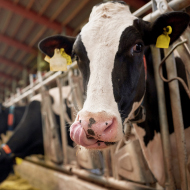
Sensor systems have the potential to provide more definitive results
New sensing technology set to detect disease and reduce the use of antibiotics in livestock is being developed by veterinary diagnostics firm, Biotangents.
The organisation is using sensing technology to enhance the accuracy of its point-of-care testing platform, to help detect common infections in livestock and reduce the use of antibiotics in farming.
Livestock diseases cost the UK economy an estimated £1 billion per year in lost productivity and mitigation and is a major issue for the global industry. Common infections in livestock, such as bovine viral diarrhoea (BVD), can cause serious immune suppression, bovine pneumonia and calf mortality, and often expensive treatment with secondary antibiotics.
Biotangents is developing an electrochemical sensing system to upgrade its prototype on-farm testing equipment in collaboration with the University of Strathclyde and CENSIS, an innovation centre for sensor and imaging systems.
They say specialist sensor systems have the potential to provide more definitive results, helping to increase the accuracy of diagnosis.
Biotangents are aiming for future iterations to be able to test for various infections and diseases at the same time, from BVD to mastitis. Recently, the business secured £1.5 billion of new investment for the development of its technology, following a second round of fundraising.
“The management and treatment of infection is essential to helping cattle stay healthy, improving welfare, and ultimately making the industry more sustainable,” said Andy Hall-Ponselè, Biotangents’ operations director.
“An accurate, speedy diagnosis is the first step in helping to limit the spread of diseases, such as BVD, which can be passed on by cows touching noses or sharing troughs.”
He continued: “Five new infectious diseases are emerging each year, and many of these can be passed on to humans. By using our advanced Moduleic Sensing diagnostic platform, we aim to enable vets to identify and manage infectious diseases at the earliest possible opportunity and minimise their chances of spreading.”
Until now, diagnostic test results could take up to a week to be returned from a central lab. The new point-of-care test, however, can produce BVD test results on the same day and potentially within one hour.
By allowing vets to extract DNA on-site, and detect infection quickly, any affected animals can be isolated for remedial action, preventing disease spread. The test also aims to make the use of antibiotics more targeted, reducing the risk of livestock resistant to treatments.



 The Animal and Plant Health Agency (APHA) has updated its online reporting service for dead wild birds.
The Animal and Plant Health Agency (APHA) has updated its online reporting service for dead wild birds.